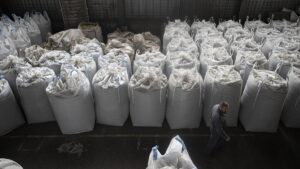
The first stage of the launch of the Unified State Register of Pets has started in Ukraine, with veterinarians being authorized, Minister of Agrarian Policy and Food Vitaliy Koval said in a telegram.
“The Unified State Register of Pets is a state register on the Diia.Engine platform. It will store data on cats, dogs, and ferrets: the name and description of the animal, information on vaccination and biosterilization, contacts of owners or keepers, and other data essential for animal health,” the minister said.
Koval reminded that the registry’s goal is to help prevent the spread of dangerous diseases more effectively, harmonize Ukrainian animal treatment legislation with the European one, and foster a culture of responsible owners who take proper care of their pets.
The register will be introduced in two stages. At the first stage, the Ministry of Agrarian Policy will focus on engaging veterinary clinics and doctors to work with the platform.
Veterinarians must submit an application to the State Service for Food Safety and Consumer Protection. To do this, the head of the veterinary medicine institution fills out an application in the office in the Register. The State Service of Ukraine on Food Safety and Consumer Protection checks the data provided, approves or rejects the application within 10 business days and sends a notification of the result of the review to the applicant’s e-mail.
After the authorization is confirmed, the head of the veterinary institution will be able to enter data on veterinarians who will directly register animals in the Register. After that, veterinarians-registration agents must log in to their offices in the Register and complete their data.
After authorization, the veterinary institution will be ready to start registering pets with the official start of the second stage of the Registry launch. The Ministry of Agrarian Policy will announce the pet registration campaign later.
As reported, the Unified State Register of Pets is a joint project of the Ministry of Agrarian Policy and Food of Ukraine, the State Service of Ukraine for Food Safety and Consumer Protection, and the Ministry of Digital Transformation.

Prime Minister Denys Shmyhal says that in the medium term, there is every opportunity to double Ukraine’s agricultural exports and provide food for up to 600 million people worldwide.
“The aggressor is trying to prevent our agricultural exports in every possible way and thus condemn dozens of vulnerable countries to starvation. Fortunately, together with you, our friends and partners, we are successfully counteracting this strategy,” Shmyhal said at the 3rd International Food Security Conference GRAIN FROM UKRAINE on Saturday.
The Prime Minister said that Ukraine has already harvested its third crop during the full-scale war, which amounts to more than 53 million tons of grains and legumes.
He noted that the 2024 harvest is still ongoing and will be sufficient for both domestic needs and exports.
Shmyhal also said that thanks to the Black Sea Logistics Corridor and other routes, Ukraine has restored its export capacity, in particular, in 10 months of 2024, the country exported more goods than in the whole of 2023, and food (sunflower oil, corn, wheat) is the main export structure.
“We supply products to more than 100 countries for more than 400 million people. These are mainly countries in Southeast Asia and Africa. In the medium term, there is every opportunity to double the volume of agricultural exports and provide food to 600 million people around the world,” the Prime Minister emphasized.

Light rain is expected in some places in the Carpathians at night on Monday, November 25, while precipitation is expected in the rest of Ukraine. According to the Ukrainian Weather Center, there will be icy conditions on the roads in the western, northern and Vinnytsia regions.
The wind will be southeast, northwest in the east and south of the country, 5-10 m/s, in the southeastern regions gusts of 15-20 m/s in some places. The temperature at night will be 2-7° below zero, in the western regions around 0°; during the day from 2° below zero to 3° above zero, in the west and south of the country 2-7° above zero.
No precipitation in Kyiv on November 25. Southeast wind, 5-10 m/s. The temperature at night will be 4-6° below zero, during the day 0-2° above zero.
According to the Borys Sreznevsky Central Geophysical Observatory, on November 25, the highest daytime temperature in Kyiv was +13.9°C in 1938, the lowest nighttime temperature was -18.4°C in 1890.
On Tuesday, November 26, Ukraine will also have mostly no precipitation, with only light snow in the eastern regions in the afternoon. In the western, northern, eastern and Vinnytsia regions, there will be ice on the roads in some places. Wind of variable directions, 3-8 m/s. The temperature at night will be 2-7° below zero; during the day from 3° below zero to 2° above zero, in the western regions and in the extreme south of the country 3-8° above zero.
No precipitation in Kyiv on November 26. Wind of variable directions, 3-8 m/s. The temperature at night will be 3-5° below zero, during the day around 0°.

Ukrainian steelmakers increased steel production by 5.7% year-on-year to 604 thousand tons from 571 thousand tons in October this year, but decreased by 0.1% compared to the previous month, when they produced 610 thousand tons.
At the same time, Ukraine took 23rd place in the ranking of 71 countries that are global producers of this product, compiled by the World Steel Association (Worldsteel).
According to Worldsteel, in October 2014, half of the top ten countries, except for Japan, the United States, Russia, South Korea, and Iran, recorded an increase in steel production compared to October 2013.
The top ten steel producing countries in October are as follows: China (81.880 million tons, up 2.9% by October 2023), India (12.456 million tons, up 1.7%), Japan (6.925 million tons, down 7.8%), the United States (6.551 million tons, down 2%), and the Russian Federation (5.6 million tons, down 15.2%), South Korea (4.487 million tons, down 18.3%), Germany (3.217 million tons, up 14.7%), Brazil (3.075 million tons, up 16.2%), Turkey (2.998 million tons, up 0.7%) and Iran (2.960 million tons, down 1.9%).
Overall, in October this year, steel production increased by 0.4% year-on-year to 151.193 million tons.
For the first 10 months of 2024, the top ten producing countries are as follows: China (850.730 million tons, down 3%), India (122.982 million tons, up 5.6%), Japan (70.214 million tons, down 3.7%), the United States (66.666 million tons, down 1.9%), and the Russian Federation (59.435 million tons, down 6.8%), South Korea (52.330 million tons, down 6.4%), Germany (31.581 million tons, up 5%), Turkey (30.905 million tons, up 12.4%), Brazil (28.394 million tons, up 6%), and Iran (24.956 million tons, up 0.6%).
In total, 71 countries produced 1 billion 546.586 million tons of steel in January-October, down 1.6% from the same period in 2023.
At the same time, Ukraine produced 6.487 million tons of steel in 10 months of 2024, up 25.7% compared to January-October 2023. The country ranks 20th in the first 10 months of 2014.
As reported, in 2023, China produced 1 billion 19.080 million tons at the level of the previous year), India (140.171 million tons, +11.8%), Japan (86.996 million tons, -2.5%), the United States (80.664 million tons, +0.2%), The Russian Federation (75.8 million tons, +5.6%), South Korea (66.676 million tons, +1.3%), Germany (35.438 million tons, -3.9%), Turkey (33.714 million tons, -4%), Brazil (31.869 million tons, -6.5%) and Iran (31.139 million tons, +1.8%).
In total, 71 countries produced 1 billion 849.734 million tons of steel in 2023, which is 0.1% less than in 2022.
At the same time, Ukraine produced 6.228 million tons of steel in 2023, which is 0.6% lower than in 2022. The country was ranked 22nd in 2023.
In 2022, the top ten steel-producing countries were as follows: China (1.013 billion tons, -2.1%), India (124.720 million tons, +5.5%), Japan (89.235 million tons, -7.4%), the United States (80.715 million tons, -5.9%), the Russian Federation (71.5 million tons, -7.2%), South Korea (65, 865 million tons, -6.5%), Germany (36.849 million tons, -8.4%), Turkey (35.134 million tons, -12.9%), Brazil (33.972 million tons, -5.8%) and Iran (30.593 million tons, +8%).
Ukraine ranked 23rd in 2022 with 6.263 million tons of steel produced (-70.7%).
In total, 64 countries produced 1 billion 831.467 million tons of steel in 2022, which is 4.3% less than in 2021.

In January-October 2024, TAS Insurance Group (Kyiv) paid UAH 1.618 billion under the concluded insurance contracts, which is 53.3% more than the company’s indemnities for 10 months of last year, according to the insurer’s website.
More than a quarter of the total volume of payments, or 27.94%, accounted for hull insurance – UAH 452.2 million, which is 38.9% higher than the corresponding figure for 10 months of 2023, 32.3% or UAH 523.5 million – for MTPL (+31.7%), 21.8% or UAH 352.8 million – for Green Card (+99.8%).
The share of VHI in the company’s claims portfolio amounted to 14.33%, or UAH 231.9 million (+87.2%) for the first eight months of the year.
TAS Group paid UAH 11 million (+60.3%) under property insurance contracts in the reporting period.
The company paid UAH 47.2 million (+85.8%) under other insurance contracts.
TAS Insurance Group was registered in 1998. It is a universal company offering more than 80 types of insurance products in various types of voluntary and compulsory insurance. It has an extensive regional network: 28 regional directorates and branches and 450 sales offices throughout Ukraine.

Finland has announced the allocation of €20.5 million to support the Ukrainian education system, the Ministry of Education and Science reports.
“20 million euros will be used to support educational reform in Ukraine as part of a project that will run from 2025 to 2028. The cooperation project was developed jointly with the Ministry of Education and Science of Ukraine, the Ministry of Education and Culture of Finland, and the Finnish National Agency for Education,” the ministry said in a statement.
In addition, Finland will provide 500 thousand euros to support the World Food Program (WFP) school feeding program in Ukraine.
According to the Minister of Education and Science of Ukraine Oksen Lisovyi, the Finnish government has been one of the key partners in education reform since 2018.
“We have many joint programs aimed at strengthening the social protection of students and providing them with psychosocial support,” he added.